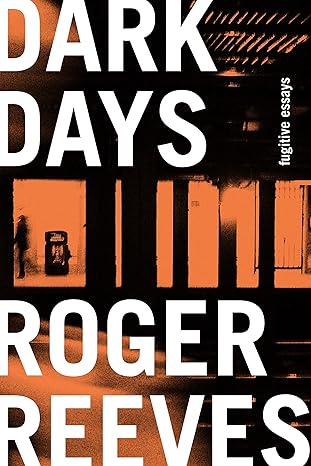Reading Event
Tuesday, April 22, 2025
Time: TBA
Olmsted room, Mandelle Hall
Join the 2024 GLCA New Writers Award for Creative Non-Fiction winner, Roger Reeves, as he gives a talk and reads from his award-winning book, Dark Days: Fugitive Essays.
Roger Reeves is the author of Dark Days: Fugitive Essays (Graywolf Press, 2023); Best Barbarian (W. W. Norton, 2022); and King Me (Copper Canyon Press, 2013), winner of the Larry Levis Reading Prize, the PEN/Oakland Josephine Miles Literary Award, and a John C. Zacharis First Book Award. His essays have appeared in Granta, the Yale Review, and elsewhere.
Reeves is also the recipient of the 2023 Griffin Poetry Prize, a Whiting Award, and a Pushcart Prize, as well as fellowships from Cave Canem, the National Endowment for the Arts, the Poetry Foundation, and Princeton University.
Dr. Reeves is currently a professor of poetry at The University of Texas, Austin.


Review
“Dark Days, poet Roger Reeves’ first collection of nonfiction, is a lyrical, erudite, and impassioned collection of essays that probe the intersection of aesthetics and ongoing racist history. Reeves looks to poetry, music, film, and digital media for both precedents of, and resistances to, the inescapable violence of our pandemic era. He dares us to imagine modes of Black sociality beyond suffering. If we think differently, he suggests, if we are attentive and make space for silence and unknowing, perhaps we could discover new forms of Black ecstasy and self-knowledge, even when everything about our current moment mitigates against it. His urgent and supple essays challenge and provoke. In asking, “What is the necessity of singing during catastrophe?” he brings together T. S. Eliot and Pharoah Sanders, Zora Neale Hurston and OutKast, Michael Williams and the Pentecostal church of his own upbringing, Toni Morrison and the 1619 Project, and his experiences as a poet and teacher. Indeed, one of this inventive collection’s hallmarks is its rigor, its constantly asking us to read more flexibly and fugitively, to embrace joy and beauty and love, to understand that “[t]o survive requires a lyric, ironic, improvisational sensibility” and to recognize that sensibility’s manifold presences in Black life and culture and its necessity for any kind of livable American future. These essays offer a meditation on race through a juxtaposition of powerful literary, political, artistic, linguistic images that speaks to the cacophony of this cultural moment. Driven by a desire for freedom, community, and ecstasy, it brilliantly theorizes through the personal as well as the historical and cultural, showing how inextricable they are, and comes out the other side with the deep wisdom earned through listening and silence. ”
— GLCA Judging Panel

